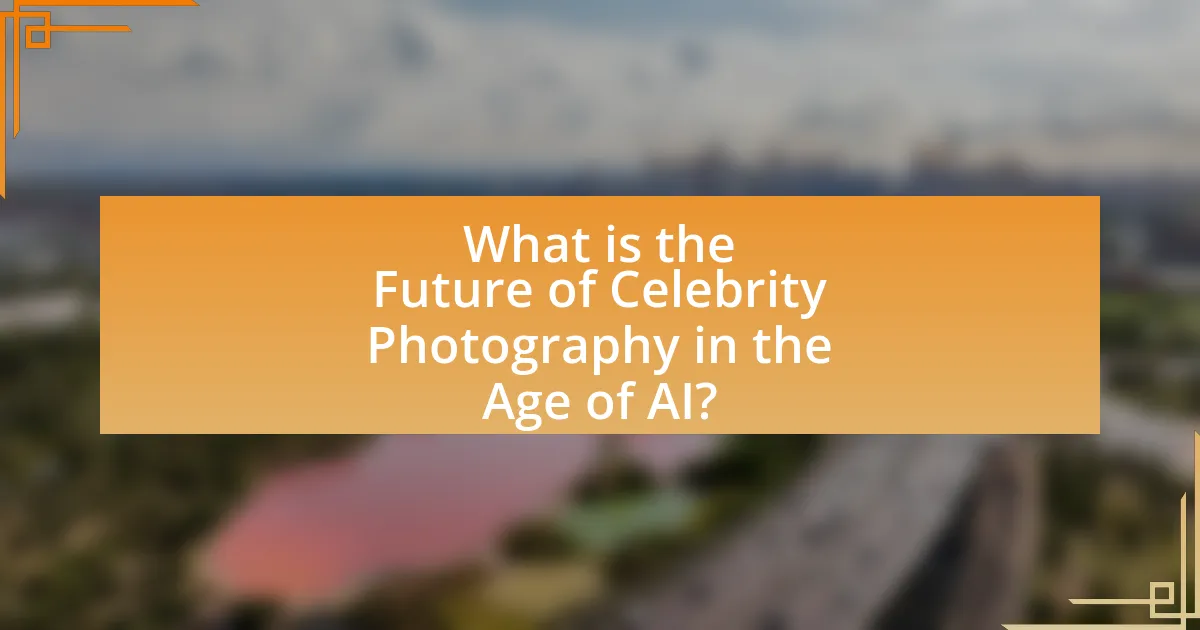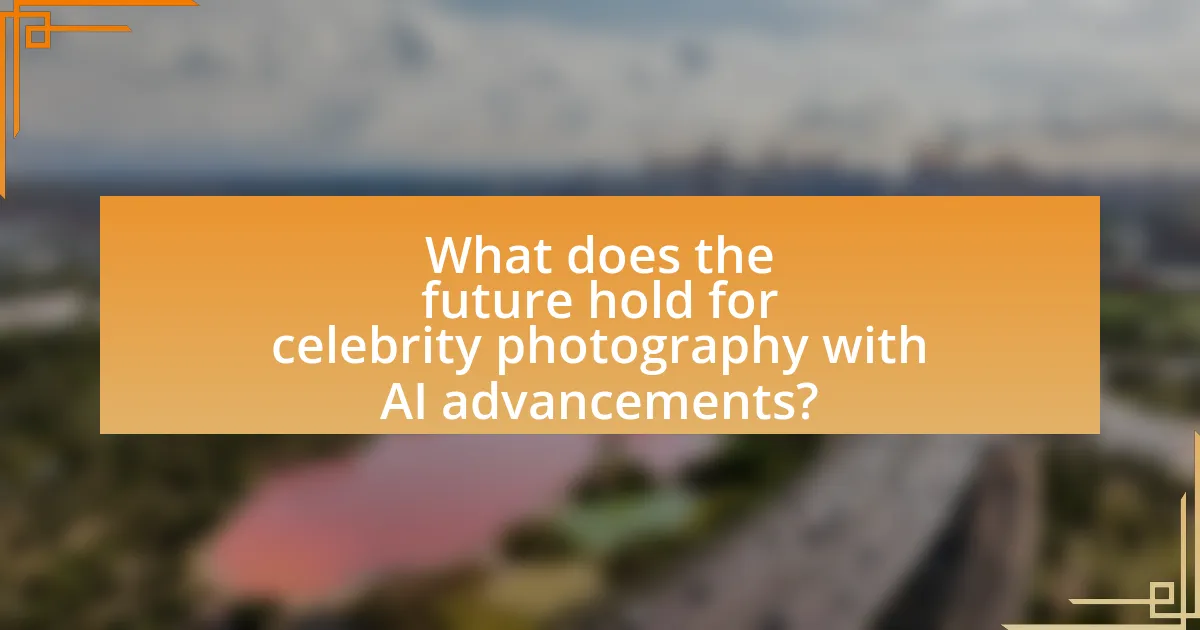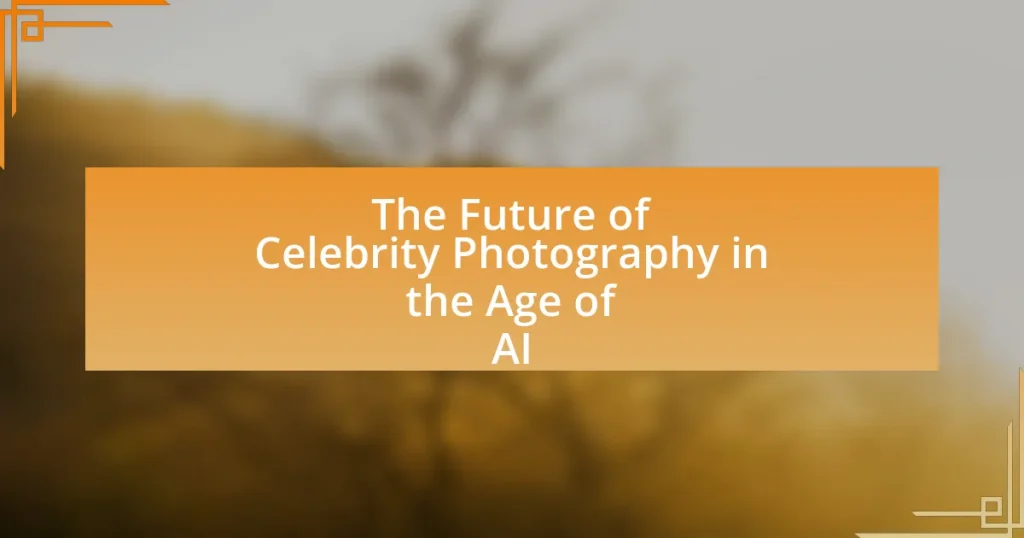The main entity of the article is the future of celebrity photography in the context of artificial intelligence (AI). The article explores how AI is transforming celebrity photography through enhanced image quality, automated editing processes, and personalized content creation. It discusses the technologies driving these advancements, such as machine learning and computer vision, and examines the ethical implications surrounding authenticity and consent. Additionally, the article highlights emerging trends influenced by social media, the challenges faced by photographers, and the strategies celebrities are employing to adapt to this evolving landscape. Overall, it provides a comprehensive overview of the intersection between AI and celebrity photography, emphasizing both opportunities and concerns in this rapidly changing field.

What is the Future of Celebrity Photography in the Age of AI?
The future of celebrity photography in the age of AI will increasingly involve the use of artificial intelligence to enhance image quality, automate editing processes, and create hyper-realistic images. AI technologies, such as machine learning algorithms, can analyze vast amounts of data to predict trends in celebrity aesthetics and public preferences, allowing photographers to tailor their work accordingly. For instance, AI-driven tools like Adobe Photoshop’s neural filters enable photographers to apply complex edits quickly, which can significantly reduce production time. Additionally, AI-generated imagery, such as deepfakes, raises ethical questions about authenticity and consent in celebrity representation. As a result, the industry may see a shift towards more regulated practices to maintain trust and integrity in celebrity photography.
How is AI transforming the landscape of celebrity photography?
AI is transforming the landscape of celebrity photography by automating image editing, enhancing image quality, and enabling personalized content creation. Advanced algorithms can now analyze and improve photographs in real-time, significantly reducing the time photographers spend on post-processing. For instance, AI tools like Adobe Photoshop’s Sensei can automatically adjust lighting and color balance, making images more visually appealing with minimal human intervention. Additionally, AI-driven platforms can generate tailored content for fans, such as personalized images or virtual meet-and-greets, enhancing engagement and interaction. This shift not only streamlines the workflow for photographers but also changes how fans experience celebrity culture, making it more accessible and interactive.
What technologies are driving AI advancements in photography?
AI advancements in photography are primarily driven by machine learning algorithms, computer vision, and neural networks. Machine learning algorithms enable systems to analyze and learn from vast datasets of images, improving their ability to recognize patterns and enhance photo quality. Computer vision technologies allow for the interpretation of visual information, facilitating tasks such as object detection and image segmentation. Neural networks, particularly convolutional neural networks (CNNs), are essential for tasks like image classification and style transfer, which have revolutionized editing and creative processes in photography. These technologies collectively enhance image processing, automate editing tasks, and enable innovative features like real-time enhancements and intelligent photo organization.
How do AI tools enhance the creative process for photographers?
AI tools enhance the creative process for photographers by automating repetitive tasks, providing advanced editing capabilities, and generating innovative ideas. These tools, such as Adobe Photoshop’s AI features and Skylum’s Luminar AI, allow photographers to streamline workflows, enabling them to focus more on artistic expression rather than technical details. For instance, AI can analyze images and suggest optimal adjustments, significantly reducing editing time. Additionally, AI-driven platforms can offer inspiration by analyzing trends and styles, helping photographers to stay relevant in a rapidly evolving industry. This integration of AI not only increases efficiency but also fosters creativity, allowing photographers to explore new artistic avenues.
What challenges does the integration of AI pose for celebrity photographers?
The integration of AI poses significant challenges for celebrity photographers, primarily through increased competition and the potential devaluation of their work. AI technologies can automate tasks such as image editing and even generate realistic images, which reduces the demand for traditional photography skills. For instance, AI-generated images can be produced at a fraction of the cost and time, leading to a market oversaturated with low-cost alternatives. This shift threatens the livelihood of photographers who rely on their unique artistic vision and expertise to capture moments. Additionally, the ethical implications of using AI in photography, such as issues of authenticity and consent, further complicate the landscape for professionals in this field.
How does AI impact the authenticity of celebrity images?
AI significantly undermines the authenticity of celebrity images by enabling the creation of hyper-realistic alterations and deepfakes. These technologies allow for the manipulation of photographs and videos, making it increasingly difficult for audiences to discern genuine images from fabricated ones. For instance, a study by the University of California, Berkeley, found that deepfake technology can produce videos that are indistinguishable from real footage to the average viewer, raising concerns about misinformation and the erosion of trust in visual media. As a result, the perception of celebrity images is increasingly shaped by AI, leading to a landscape where authenticity is frequently questioned.
What ethical considerations arise from using AI in photography?
The ethical considerations arising from using AI in photography include issues of consent, authenticity, and bias. Consent is crucial as AI-generated images may not accurately represent the subjects, leading to potential misrepresentation without their approval. Authenticity concerns arise when AI alters or creates images that could deceive viewers about reality, impacting trust in visual media. Additionally, bias in AI algorithms can perpetuate stereotypes or exclude diverse representations, affecting the portrayal of individuals in celebrity photography. These considerations highlight the need for ethical guidelines to govern AI’s role in photography.
What trends are emerging in celebrity photography due to AI?
Emerging trends in celebrity photography due to AI include the use of advanced image editing tools, automated content generation, and personalized fan interactions. AI-driven software allows photographers to enhance images with precision, creating visually stunning results that were previously time-consuming. Additionally, AI algorithms can generate realistic images or videos of celebrities, enabling the production of content without the need for physical shoots. This technology also facilitates personalized experiences for fans, as AI can analyze user preferences to deliver tailored content. These trends reflect a significant shift in how celebrity photography is created and consumed, driven by technological advancements in AI.
How are social media platforms influencing AI-driven photography styles?
Social media platforms are significantly influencing AI-driven photography styles by promoting trends that prioritize visual aesthetics and engagement. These platforms, such as Instagram and TikTok, encourage users to share visually appealing content, leading AI algorithms to adapt by emphasizing styles that enhance colors, contrast, and composition to attract viewer attention. For instance, the rise of filters and editing tools on these platforms has driven AI to develop techniques that mimic popular artistic styles, such as vintage or cinematic looks, to meet user preferences. This trend is supported by data indicating that posts with high-quality visuals receive up to 94% more views, demonstrating the direct impact of social media on the evolution of photography styles driven by AI.
What role does audience engagement play in shaping these trends?
Audience engagement significantly influences the trends in celebrity photography, particularly in the context of AI advancements. Engaged audiences drive demand for more personalized and authentic content, prompting photographers and brands to adapt their strategies accordingly. For instance, social media platforms like Instagram have shown that posts with higher engagement rates often feature candid, relatable images rather than traditional posed shots, reflecting audience preferences for authenticity. This shift is supported by a 2021 study from the Pew Research Center, which found that 72% of social media users prefer content that feels genuine and unfiltered. Consequently, audience engagement not only shapes the types of images that gain popularity but also informs the techniques and technologies used in capturing celebrity moments, leading to a more dynamic and responsive photography landscape.

How are celebrities adapting to AI in photography?
Celebrities are adapting to AI in photography by utilizing advanced tools for image enhancement, content creation, and personalized marketing. For instance, many celebrities are employing AI-driven software to retouch photos, allowing for quicker and more efficient editing processes that maintain high-quality standards. Additionally, AI algorithms are being used to analyze audience preferences, enabling celebrities to tailor their visual content to better engage their fan base. This shift is evidenced by the increasing use of AI-generated imagery in promotional materials, as seen in campaigns by high-profile figures like Kim Kardashian, who has embraced AI tools to create unique visual content that resonates with her audience.
What strategies are celebrities using to maintain their image in an AI-driven world?
Celebrities are employing several strategies to maintain their image in an AI-driven world, including leveraging social media, engaging in direct communication with fans, and utilizing AI tools for image management. By actively curating their online presence through platforms like Instagram and Twitter, celebrities can control the narrative surrounding their image and respond quickly to any misinformation. Additionally, many are using AI-driven analytics to understand audience preferences and tailor their content accordingly, ensuring that their public persona aligns with fan expectations. For instance, a study by the Pew Research Center indicates that 72% of adults use social media, highlighting its importance for celebrities in shaping public perception.
How do celebrities collaborate with AI photographers?
Celebrities collaborate with AI photographers by utilizing advanced algorithms to create unique and stylized images that enhance their public personas. This collaboration often involves celebrities providing input on their desired aesthetics, which AI systems then use to generate images that align with those preferences. For instance, AI can analyze thousands of existing photographs to identify trends and styles that resonate with a celebrity’s brand, allowing for tailored visual content. Additionally, platforms like Daz 3D and Artbreeder enable celebrities to experiment with AI-generated visuals, further refining their image in a rapidly evolving digital landscape.
What are the implications of AI-generated images for celebrity branding?
AI-generated images significantly impact celebrity branding by altering how celebrities are perceived and marketed. These images can create hyper-realistic representations that may enhance a celebrity’s image or lead to misrepresentation. For instance, AI can produce visuals that showcase celebrities in various contexts, potentially broadening their appeal and marketability. However, this technology also raises ethical concerns regarding authenticity and consent, as unauthorized AI-generated images can mislead fans and damage reputations. The rise of AI in this domain necessitates new strategies for brand management, as celebrities must navigate the balance between innovative marketing and maintaining their genuine identity.
How do celebrities perceive the impact of AI on their public persona?
Celebrities perceive the impact of AI on their public persona as a double-edged sword, recognizing both opportunities and challenges. On one hand, AI technologies can enhance their visibility and engagement with fans through personalized content and targeted marketing strategies. For instance, AI-driven analytics allow celebrities to understand audience preferences better, leading to more effective communication. On the other hand, celebrities express concerns about authenticity and privacy, fearing that AI-generated content could misrepresent them or lead to the creation of deepfakes, which can damage their reputation. A survey conducted by the Digital Media Association in 2023 revealed that 68% of celebrities are worried about the potential misuse of AI in altering their images or statements, highlighting the tension between leveraging technology and maintaining control over their public image.
What concerns do celebrities have regarding privacy and AI?
Celebrities are primarily concerned about the invasion of their privacy due to AI technologies that can generate realistic images and videos without their consent. This capability raises fears of deepfakes, where AI can manipulate their likeness for malicious purposes, potentially damaging their reputation and personal lives. For instance, a report by the Digital Media Association highlights that 70% of celebrities express anxiety over unauthorized use of their images by AI, indicating a significant concern about how easily their identities can be exploited.
How do celebrities leverage AI for personal storytelling through photography?
Celebrities leverage AI for personal storytelling through photography by utilizing advanced algorithms to enhance visual narratives and create personalized content. These technologies allow them to analyze audience preferences, optimize image aesthetics, and generate unique visual styles that resonate with their followers. For instance, AI tools can automatically edit photos, apply filters, and even create deepfake images that align with a celebrity’s brand, enabling them to craft compelling stories that engage their audience effectively. This approach is supported by the growing trend of AI-driven platforms, which have seen a significant increase in usage among public figures, as evidenced by a report from McKinsey, indicating that 70% of companies are adopting AI to improve customer engagement and personalization.

What does the future hold for celebrity photography with AI advancements?
The future of celebrity photography will be significantly shaped by AI advancements, leading to enhanced image quality, personalized content, and streamlined production processes. AI technologies, such as machine learning and computer vision, will enable photographers to analyze trends and audience preferences, allowing for more targeted and engaging imagery. For instance, AI can automate editing tasks, reducing the time required for post-production, while also providing tools for creating hyper-realistic images or even generating synthetic celebrity likenesses. This evolution is supported by the increasing integration of AI in creative industries, as evidenced by the rise of AI-generated art and photography tools that have gained popularity among professionals.
How will AI continue to evolve in the field of celebrity photography?
AI will continue to evolve in the field of celebrity photography by enhancing image recognition, automating editing processes, and personalizing content delivery. Advanced algorithms will improve the accuracy of identifying celebrities in images, enabling faster tagging and organization of vast photo libraries. Automation tools will streamline editing tasks, such as retouching and color correction, significantly reducing the time photographers spend on post-production. Furthermore, AI-driven analytics will allow for tailored content distribution, ensuring that images reach the right audiences based on engagement metrics. These advancements are supported by ongoing developments in machine learning and computer vision technologies, which are increasingly being integrated into photography workflows.
What innovations can we expect in AI photography tools?
Innovations in AI photography tools will include advanced image enhancement algorithms, real-time editing capabilities, and automated content generation. These tools will leverage deep learning techniques to improve image quality by reducing noise, enhancing colors, and optimizing lighting conditions. For instance, AI-driven software can analyze thousands of images to learn the best editing practices, resulting in faster and more efficient workflows for photographers. Additionally, features like automatic background removal and intelligent subject tracking will streamline the editing process, allowing for more creative freedom. The integration of augmented reality (AR) will also enable photographers to visualize edits in real-time, enhancing the creative process. These advancements are supported by ongoing research in machine learning and computer vision, which continuously improve the capabilities of AI in photography.
How might AI change the way fans interact with celebrity images?
AI will transform fan interactions with celebrity images by enabling personalized and immersive experiences. Through advanced algorithms, AI can analyze fan preferences and curate tailored content, such as customized images or augmented reality experiences featuring celebrities. For instance, platforms like Instagram and Snapchat already utilize AI to enhance user engagement by suggesting filters and effects that resonate with individual users. This personalization fosters a deeper emotional connection between fans and celebrities, as fans can see themselves in unique scenarios with their favorite stars. Additionally, AI-generated imagery can create realistic simulations of celebrity interactions, allowing fans to engage in virtual meet-and-greets or events, further blurring the lines between reality and digital experiences.
What best practices should photographers adopt in the age of AI?
Photographers should adopt a combination of ethical practices, continuous learning, and technological integration in the age of AI. Ethical practices include ensuring that AI-generated content is clearly labeled to maintain transparency with audiences. Continuous learning is essential as photographers must stay updated on AI tools and techniques that can enhance their work, such as AI-driven editing software that can streamline workflows and improve image quality. Technological integration involves utilizing AI for tasks like image recognition and organization, which can save time and allow photographers to focus on creativity. According to a report by McKinsey, 70% of companies are expected to adopt AI technologies by 2030, highlighting the importance for photographers to embrace these advancements to remain competitive in the industry.
How can photographers balance technology and artistry in their work?
Photographers can balance technology and artistry by integrating advanced tools while maintaining their creative vision. Utilizing technology such as high-resolution cameras, editing software, and AI-driven applications allows photographers to enhance their work, but they must prioritize their unique artistic style and storytelling. For instance, a study by the International Journal of Arts and Technology highlights that photographers who effectively combine technical skills with personal expression produce more compelling images, demonstrating that the synergy of both elements leads to greater artistic impact.
What skills will be essential for photographers to thrive in an AI-driven environment?
Photographers will need strong technical skills, creativity, and adaptability to thrive in an AI-driven environment. Technical skills include proficiency in using AI tools for image editing and enhancement, which can streamline workflows and improve output quality. Creativity remains essential as photographers must develop unique styles and concepts that differentiate their work in a market increasingly influenced by AI-generated content. Adaptability is crucial, as photographers must stay updated with evolving technologies and trends, ensuring they can effectively integrate AI into their practices. The demand for human creativity and emotional connection in photography will persist, making these skills vital for success.



